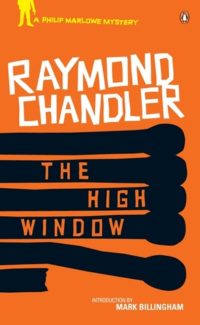Washed gently by the lapping waves of time
 The High Window
The High Window
by Raymond Chandler
Tim and I have both been working our way gradually through the Philip Marlowe books since I picked one up in 2011. He’s now a couple ahead of me and assures me there are no duds.
While Chandler may not have invented pulp fiction or purple prose, he really and truly mastered the art. From the first page, the language is exquisite. In the wrong hands this would be overwritten, or artificial, but Chandler uses it as the perfect reflection of his hero’s highly coloured view of the world.
Private investigator Philip Marlowe is really growing on me as a character. Deeply cynical and ever-so-aware of the worst of humanity, he is somehow not a morose pessimist who has given up on the world. Instead, he is ever hopeful, ever the gentleman, in his quiet take-no-notice-of-me way. Plus, he’s funny.
“I looked into the reception-room. It was empty of everything but the smell of dust. I threw up another window, unlocked the communicating door and went into the room beyond…a framed licence bond on the wall, a phone, a washbowl in a stained wood cupboard, a hat-rack, a carpet that was just something on the floor, and two open windows with net curtains that puckered in and out like the lips of a toothless old man sleeping. The same stuff I had had last year, and the year before that. Not beautiful, not gay, but better than a tent on the beach.”
In this third Marlowe novel, he is asked by the very old, very rich Mrs Murdock to recover a rare and valuable coin that has gone missing from her late husband’s collection. She is convinced she already knows who took it – the young lady who was briefly married to her hapless son before recently running away – but that doesn’t make its recovery any simpler. Marlowe is soon stumbling over dead bodies and annoying the LAPD with his refusal to explain why he keeps running into them, both of which spell trouble.
Like many books from this era, this touches on domestic abuse without properly dealing with it. But unusually, this book acknowledges the lasting effect that abuse can have, the reality of psychological trauma, even if the language surrounding it would not be considered PC these days.
“The door was stopped by his leg. I pushed hard and edged around it and got in. I bent down to push two fingers into the side of his neck against the big artery. No artery throbbed there, or even whispered. Nothing at all. The skin was icy. It wouldn’t have been icy, I just thought it was. I straightened up and leaned my back against the door and made hard fists in my pockets and smelled the cordite fumes.”
There are some great characters as always. Mrs Murdock is shrewd and a little unpredictable, while her mousy secretary Miss Davis has surprising depths. Amateurish detective George Anson Philips lets himself be talked into a terrible job, while Hench is a drunk brute who seems to have been framed a little too neatly for murder. There are show girls and mob bosses, a missing dentist, a messy divorce – all the right ingredients.
The real draw, though, is the setting. Chandler’s descriptions of Los Angeles’ many and various neighbourhoods are a true delight. There is a revelation in language used this way, stretched and squeezed to say something original that tells us about Marlowe and the case, when it appears to be merely describing an apartment building or a shop.
“The wind had risen and had a dry taut feeling, tossing the tops of trees, and making the swung arc-light up the side street cast shadows like crawling lava…The hock shop was on Santa Monica, near Wilcox, a quiet old-fashioned little place, washed gently by the lapping waves of time. In the front window there was everything you could think of from a set of trout flies…to a single action Frontier Colt, .44 calibre, the model they still make for Western peace officers whose grandfathers taught them how to file the trigger and shoot by fanning the hammer back.”
Part of the joy of a Marlowe novel is seeing where it winds up. It’s not a whodunit like an Agatha Christie, where you can pick up the clues and try to guess before the end. It’s more a case of following Marlowe on his journeys around LA as he pieces it all together, generally with as many setbacks as steps forward.
I always intend to pick up the next in the series right away and then end up leaving it at least a year. But I really would happily jump straight back into Chandler’s LA.
First published 1943 by Hamish Hamilton.
Source: Really don’t remember. Probably a Waterstones.